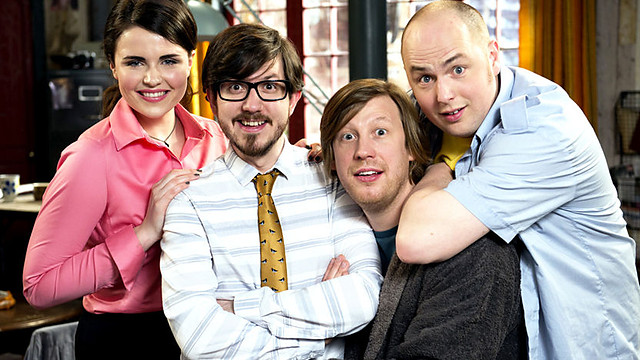Telly Vision: Badults (BBC3) and Count Arthur Strong (BBC2)

Beginnings are interesting things, and few beginnings are more interesting than sitcom opening sequences.
Witness the cartoon title sequence at the start of Mrs. Brown’s Boys with its cheesy keyboard parps, its studio announcer and that brief glimpse of the assembled audience before they cut to the action.
See Miranda Hart welcoming the audience to this week’s adventure at the opening of each episode of Miranda.
Say what you like about today’s titans of UK sitcom, but they know how to tell an audience exactly what kind of show they’re about to see, and they do it in seconds. Both did it from the first moment of their first episodes too.
The two most recent debuts in the BBC’s latest ‘return’ to multi-camera studio sitcom (i.e. their attempt to repeat the success of Mrs. Brown’s Boys and Miranda, while marketing them as if they’re setting a see to Getting On’s saw) offer interesting contrasts in the way they introduce themselves to their audience.
Count Arthur Strong (BBC2) and Badults (BBC3) both come from well-established teams, but portray vastly different confidence levels in their opening moments.
Count Arthur, a transfer of Steve Delany’s infinitely long-running Radio 4 show to TV, takes the first few minutes of its first episode to break the audience in to what the show is going to be.
Opening with proper thesp and straight-man-in-chief Rory Kinnear, the show begins in single-camera glossiness, and slowly guides the viewer, via a hinting laugh track and an open door into the Count’s multi-camera world.
Graham Linehan has joined Count Arthur creator and performer Delany as co-writer of the TV version of the show, and it’s difficult not read this as a version the IT Crowd’s opening scene, albeit with a much more pronounced tonal and visual shift.
In subsequent episodes, we open with a parpy theme tune and Arthur (Delany) and Michael (Kinnear) standing in front of a proscenium arch, which is about right for the old-school staginess of the piece.
Badults on the other hand, the sitcom from live sketch favourites Pappy’s, bangs straight in there with a self-penned theme tune, and an image of the three boys dressed up as the Inbetweeners, before cutting to the three in the adult flat-share that is the sitcom’s set.
Badults started under the working title The Secret Dude Society, which is proof, if such proof were needed, that Pappy’s are quite bad at naming things.
The title, and the show’s title sequence, give the audience a bad steer – because this doesn’t at all touch on Him & Her-like themes of arrested development, or Inbetweeners-ey coming of age gross out stuff: it’s Pappy’s, and they’re doing Pappy’sish stuff.
It’s a real shame, because anyone who has seen Pappy’s live knows that they’re not normally bad at beginnings.
This one does little to ease the viewer into the world of their show.
Though beginnings are interesting things, sitcoms are notoriously difficult to judge from their first few episodes.
Count Arthur Strong has made a sensible transition to the telly, adding some decent sight gags and a new point-of-view character in the shape of Kinnear’s Michael.
Three episodes in, however, I’m not sure if it will be the hit the Beeb are said to be looking for.
Like the radio version, it’s amiable, sharply-tooled and knows exactly what it is, but it remains a 6.30-on-a-Thursday-on-Radio 4 kind of prospect.
Badults, though, I have a sneaky feeling for.
Sitcom history is lightly dusted with shows that started a little uncertainly, and most of them were more faulty than simply having an undercooked title sequence.
Once the show itself gets going, it’s inventive, gag rich and very funny.
Built around the theme of money, this first episode rockets through a rags-to-riches-to-rags-to-riches tale at a pace that would put The Fast Show to shame, while putting together an impressively tightly-woven tapestry of highly televisual gags.
Get past that title sequence, tell yourself it’s called Pappy’s: The Sitcom, and I think you’ll enjoy.
It could do with a better opening, but it’s a very strong beginning.



































